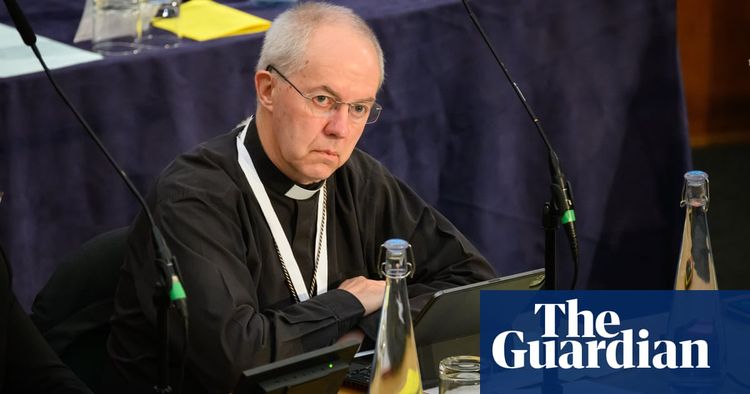Justin Welby’s personal link to child abuser adds fuel to resignation calls

The demands for the Archbishop of Canterbury to step down due to his “failures and omissions” related to the brutal abuser John Smyth have not emerged unexpectedly.
Welby was informed about claims of Smyth's abusive behavior 11 years ago. Seven years back, Channel 4 News highlighted these accusations, and the independent review of how the church dealt with the allegations has been in progress for over five years.
In the late 1970s and early 1980s, Smyth targeted boys from public schools who went to evangelical Christian summer camps. He would bring them to a shed in his garden at his home close to Winchester and subjected them to brutal beatings.
The evaluation, directed by Keith Makin, noted that Smyth, who passed away in 2018, inflicted "severe physical, sexual, psychological, and spiritual harm" on his victims. The effects of this abuse are profound and have left lasting scars on the lives of those affected. Unfortunately, some individuals have even attempted suicide as a result.
In 1982, a covert investigation by the Iwerne Trust, which sponsored the holiday camps, was kept under wraps. Winchester College, the prestigious school many victims attended, prohibited Smyth from entering its grounds but failed to inform the police about his offenses.
Smyth relocated to Zimbabwe, where he continued to harm young boys and was accused of murdering a 16-year-old at a holiday camp in 1992; however, the case was thrown out. He then moved to South Africa, where in 2017 he was ousted from his position as a leader in a local church in Cape Town due to allegations of inappropriate conduct.
Welby first met Smyth while volunteering at the Iwerne Trust holiday camps in Dorset. Reflecting on their encounter in 2017, he described Smyth as "a charming and delightful person who was also very smart and an exceptional speaker." He noted that he wasn't particularly close to Smyth and didn't belong to his close-knit group or the camp's leadership.
He stated that he had no idea about the abuse or any worries regarding Smyth back then. However, last week’s report indicated that this is "unlikely". While Welby might not have been fully aware of the grave nature of the abuse, it is very likely that he was aware to some extent that John Smyth raised some concerns.
In 2013, shortly after Welby began his position as archbishop, he and other high-ranking officials were made aware of the allegations. Recently, he admitted that he did not push for an investigation with the determination and thoroughness it deserved. He described it as a deeply embarrassing failure.
By 2013, there was no longer any reason to remain inactive. Looking back thirty years earlier, when the first signs of Smyth's abuse came to light, one could argue that there was a prevailing mindset that overlooked the harm caused by such abuse, allowing institutions to focus more on protecting their image than on delivering justice.
By 2013, the scale and consequences of abuse within the Catholic Church had sent shockwaves across the globe, while the Church of England's own past of abuse and its attempts to conceal it were also coming to light.
Welby's reaction to Smyth, similar to his approach in other situations, seems to have been a desire for the problems to simply fade away, expecting that the survivors would abandon their quest for the truth. Numerous survivors report that the trauma from their abuse has been intensified by how the church has treated them afterward. Many express that it feels as if they are being victimized again.
Since Welby took on the role of archbishop, the Church of England has released several reports regarding its management of abuse cases. Almost all of these reports have revealed signs of hiding information, covering up incidents, and trying to minimize damage to its reputation.
The Church of England has invested significant funds and resources in its initiatives to enhance safeguarding practices and rectify previous errors. While there has been some progress, many survivors feel that the church's overall reaction has been uneven and frequently harmful during Welby’s tenure.
What makes this situation stand out is that Welby is personally involved. He was present at the holiday camps while Smyth—a man he held in high regard—was exploiting boys for cruel pleasure. Welby had authority when victims began to speak out, yet he did not take action. The Church of England has been slow to follow through on the investigation it initiated regarding Smyth's offenses. It's no surprise that more people are calling for Welby's resignation.
Many of those who express their opinions most strongly have additional disagreements with Welby. Traditionalists are frustrated by his managerial approach and believe he does not value the small parish churches that have long been the foundation of the Church of England. They also argue that he has been too accommodating towards same-sex couples. On the other hand, those with a more progressive perspective feel he hasn't pushed reforms far enough and contend that the Church is lagging behind modern society. Currently, both sides seem to be discovering some shared ground.
Currently, Welby seems determined to keep adding to the lengthy list of apologies and acknowledgments of guilt regarding clerical abuse, probably in an effort to weather the current issues. He already has intentions to announce his retirement in the coming months, which is set to take effect when he reaches 70 in January 2026. While he is likely eager to avoid being pushed out early, he may also be looking forward to more peaceful times in the future.











































